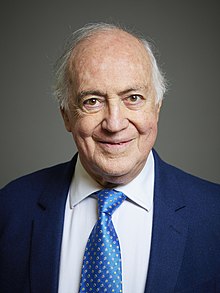
Back ميخائيل هوارد Arabic مايكل هوارد ARZ Michael Howard Czech Michael Howard Welsh Michael Howard Danish Michael Howard German Michael Howard Spanish Michael Howard Basque مایکل هوارد Persian Michael Howard Finnish
The Lord Howard of Lympne | |||||||||||||||||||||||||||||||||||||||||||||
|---|---|---|---|---|---|---|---|---|---|---|---|---|---|---|---|---|---|---|---|---|---|---|---|---|---|---|---|---|---|---|---|---|---|---|---|---|---|---|---|---|---|---|---|---|---|
 Official portrait, 2023 | |||||||||||||||||||||||||||||||||||||||||||||
| Leader of the Opposition | |||||||||||||||||||||||||||||||||||||||||||||
| In office 6 November 2003 – 6 December 2005 | |||||||||||||||||||||||||||||||||||||||||||||
| Monarch | Elizabeth II | ||||||||||||||||||||||||||||||||||||||||||||
| Prime Minister | Tony Blair | ||||||||||||||||||||||||||||||||||||||||||||
| Preceded by | Iain Duncan Smith | ||||||||||||||||||||||||||||||||||||||||||||
| Succeeded by | David Cameron | ||||||||||||||||||||||||||||||||||||||||||||
| Leader of the Conservative Party | |||||||||||||||||||||||||||||||||||||||||||||
| In office 6 November 2003 – 6 December 2005[note 1] | |||||||||||||||||||||||||||||||||||||||||||||
| Preceded by | Iain Duncan Smith | ||||||||||||||||||||||||||||||||||||||||||||
| Succeeded by | David Cameron | ||||||||||||||||||||||||||||||||||||||||||||
| Home Secretary | |||||||||||||||||||||||||||||||||||||||||||||
| In office 27 May 1993 – 2 May 1997 | |||||||||||||||||||||||||||||||||||||||||||||
| Prime Minister | John Major | ||||||||||||||||||||||||||||||||||||||||||||
| Preceded by | Kenneth Clarke | ||||||||||||||||||||||||||||||||||||||||||||
| Succeeded by | Jack Straw | ||||||||||||||||||||||||||||||||||||||||||||
| Secretary of State for the Environment | |||||||||||||||||||||||||||||||||||||||||||||
| In office 11 April 1992 – 27 May 1993 | |||||||||||||||||||||||||||||||||||||||||||||
| Prime Minister | John Major | ||||||||||||||||||||||||||||||||||||||||||||
| Preceded by | Michael Heseltine | ||||||||||||||||||||||||||||||||||||||||||||
| Succeeded by | John Gummer | ||||||||||||||||||||||||||||||||||||||||||||
| Secretary of State for Employment | |||||||||||||||||||||||||||||||||||||||||||||
| In office 3 January 1990 – 11 April 1992 | |||||||||||||||||||||||||||||||||||||||||||||
| Prime Minister | Margaret Thatcher John Major | ||||||||||||||||||||||||||||||||||||||||||||
| Preceded by | Norman Fowler | ||||||||||||||||||||||||||||||||||||||||||||
| Succeeded by | Gillian Shephard | ||||||||||||||||||||||||||||||||||||||||||||
| |||||||||||||||||||||||||||||||||||||||||||||
| |||||||||||||||||||||||||||||||||||||||||||||
| |||||||||||||||||||||||||||||||||||||||||||||
| Personal details | |||||||||||||||||||||||||||||||||||||||||||||
| Born | Michael Hecht 7 July 1941 Gorseinon, Swansea, Wales | ||||||||||||||||||||||||||||||||||||||||||||
| Political party | Conservative | ||||||||||||||||||||||||||||||||||||||||||||
| Other political affiliations | Labour (1961) | ||||||||||||||||||||||||||||||||||||||||||||
| Spouse | |||||||||||||||||||||||||||||||||||||||||||||
| Children | 2[citation needed] | ||||||||||||||||||||||||||||||||||||||||||||
| Alma mater | Peterhouse, Cambridge (MA, LLB) Inns of Court School of Law | ||||||||||||||||||||||||||||||||||||||||||||
Michael Howard, Baron Howard of Lympne CH PC KC (born Michael Hecht; 7 July 1941)[1] is a British politician who was Leader of the Conservative Party and Leader of the Opposition from November 2003 to December 2005. He previously held cabinet positions in the governments of Margaret Thatcher and John Major, including Secretary of State for Employment, Secretary of State for the Environment and Home Secretary.
Howard was born in Swansea to a Jewish family, his father from Romania and his mother from Wales. He studied at Peterhouse, Cambridge, following which he joined the Young Conservatives. In 1964, he was called to the Bar and became a Queen's Counsel in 1982. He first became a Member of Parliament at the 1983 general election, representing the constituency of Folkestone and Hythe. This quickly led to his promotion and Howard became Minister for Local Government in 1987. Under the premiership of John Major, he served as Secretary of State for Employment (1990–1992), Secretary of State for the Environment (1992–1993) and Home Secretary (1993–1997).
Following the Conservative Party's landslide defeat at the 1997 general election, he unsuccessfully contested the leadership, and subsequently held the posts of Shadow Foreign Secretary (1997–1999) and Shadow Chancellor of the Exchequer (2001–2003). In November 2003, following the Conservative Party's vote of no confidence in Iain Duncan Smith, Howard was elected to the leadership unopposed.
At the 2005 general election, the Conservatives gained 33 new seats in Parliament, including five from the Liberal Democrats; but this still gave them only 198 seats to Labour's 355. Following the election, Howard resigned as Leader of the Conservative Party and was succeeded by David Cameron. Howard did not contest his seat of Folkestone and Hythe in the 2010 general election and entered the House of Lords as Baron Howard of Lympne. Prior to Brexit, he was supportive of the Eurosceptic pressure group Leave Means Leave.[2]
Cite error: There are <ref group=note> tags on this page, but the references will not show without a {{reflist|group=note}} template (see the help page).
- ^ "Howard of Lympne, Baron, (Michael Howard) (born 7 July 1941)". Who's Who & Who Was Who. 2007. doi:10.1093/ww/9780199540884.013.u20909. ISBN 978-0-19-954088-4. Archived from the original on 12 June 2021. Retrieved 12 June 2021.
- ^ "No Brexit unless we back Theresa May, Jeremy Hunt says". BBC News. 3 December 2017. Archived from the original on 4 December 2020. Retrieved 21 July 2018.